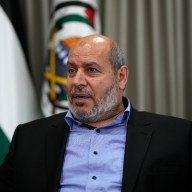BANGKOK – Two consecutive victories in local elections by allies of former Prime Minister Thaksin Shinawatra have buoyed backers’ hopes for resurrection of their disgraced leader, who continues to exercise his influence over Thai politics while remaining in self-imposed exile to avoid a jail term back home.
Thaksin, who was ousted in a 2006 military coup after being accused of corruption and abuse of power, had been all but written off by his foes and many in the mainstream Thai media after his supporters rioted in the capital in April and seemed to discredit his movement.
The billionaire politician was already on the run before being convicted last year of violating a conflict of interest law that saw him sentenced in absentia to two years in prison, and much of his fortune remains frozen in Thai banks.
He has also come under increasing pressure internationally, forced to use a variety of passports to travel after his Thai credentials were cancelled and he was barred from several countries, including Britain and Germany, following diplomatic pressure from Thailand.
But the Pheua Thai Party – filled with many of Thaksin’s former allies and seen by supporters as the party representing his interests – still managed to romp home with an estimated 62 per cent of the vote in Sunday’s byelection to fill an empty parliamentary seat in the northeastern province of Sisaket. That count comes from the election commission, though it has yet to certify the results.
The victory came a week after another Pheua Thai candidate swept 76 per cent of the votes in Sakhon Nakhon, also in Thailand’s northeast, the heavily populated region that has always been the bulwark of Thaksin’s support.
“This is very good for our morale. We have been bullied in various ways for the past few years,” said Thaksin’s brother Payap, an executive member of Pheua Thai. “The public have not abandoned us, and we will fight along their side for democracy and for better living conditions.”
Thaksin’s supporters are regrouping, and about 20,000 to 30,000 turned out for a rally Saturday in Bangkok, braving sporadic downpours to hear speeches calling for Prime Minister Abhisit Vejjajiva’s resignation, the dissolution of parliament, and new elections.
Abhisit acknowledged Monday that Thaksin’s support “is still there.” But he said the election results had been expected because the northeast is Pheua Thai’s base and it campaigned hard.
In both polls, the losing candidates were from parties that are junior members of the ruling coalition headed by Abhisit, whose Democrat Party took power in December.
So convincing were the election results that they may actually have a silver lining for Abhisit, as the fractious junior partners in his coalition weigh the benefits of sticking with him against the risks of taking their chances of quitting and triggering new polls.
“Right now, they don’t want a new election. Despite cracks within the coalition, they would rather stick with it because they know they may lose in the next round,” said Somjai Phagaphasvivat, associate professor of political science at Thammasat University.
“But this may change in the next two to three months as the protest movement gains momentum and people become more frustrated with the government’s management of the economy,” he said.
Thaksin’s autocratic leanings and alleged corruption while in power from 2001-2006 drew resentment from the Bangkok elite, the military and people associated with the monarchy. Those forces tried to erase Thaksin’s legacy, dissolving his political party, changing the constitution and opening criminal investigations against him.
But he has retained widespread popularity among rural people and the urban poor, who benefited from his populist social welfare policies.
In December 2007, his political allies – reassembled as the People’s Power Party – topped the polls in a new election.
But court rulings and demonstrations throughout 2008 – including the seizure of the seat of government for several months and the occupation of Bangkok’s two airports – by the same protesters who called for Thaksin’s ouster in 2006 forced out two People’s Power Party prime ministers and gave Abhisit’s Democrats the chance to form a new coalition government.
Thaksin’s supporters, allied with pro-democracy groups, responded by taking to the streets themselves earlier this year, seeking to oust Abhisit for allegedly coming to power illegitimately. Those demonstrations were put down by the military when they turned violent in April.
Thaksin has supported the offensive on his behalf by rallying his fans with video and telephone call-ins, and allegedly financing both the political and popular movements on his behalf.
Those gathered at Saturday’s rally heard Thaksin call for the government to “return justice and true democracy.”
Playing to the sympathetic crowd, he also complained that he was lonely and serenaded the crowd with a song that included the line “Don’t leave me in Dubai” – a reference to one of the cities he has called home since fleeing into exile.
















